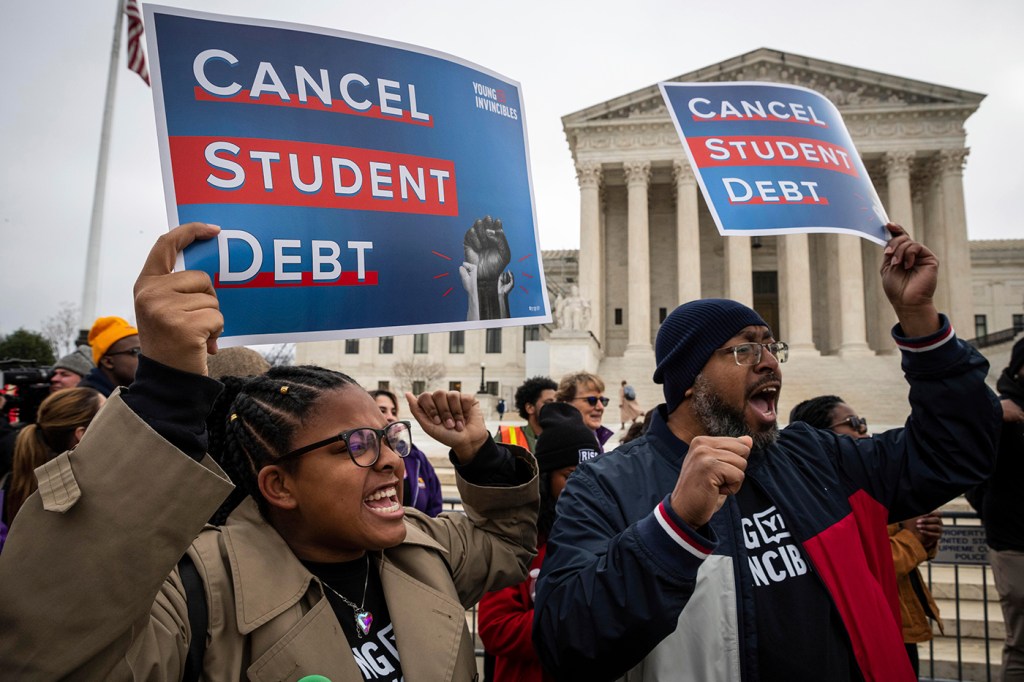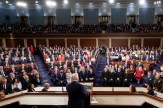Would a Biden defeat at the Supreme Court signal the end of student loan debt cancellation, or is there a Plan B?

The U.S. Supreme Court last week heard oral arguments in two separate cases challenging President Joe Biden’s student debt forgiveness program.
Before a judge in Texas declared the plan illegal in November, tens of millions of borrowers could have applied for up to $20,000 in student loan forgiveness. Those who earned less than $125,000 per year, or $250,000 per household, were eligible to receive $10,000 in cancellation, and those who met the income criteria and received a Pell Grant were eligible for up to $20,000 in cancellation. The plan also included an extended pandemic-related pause on repayments active through June 30, 2023, or until the court cases are resolved.

Both challenges—one from a group of Republican-led states, the other from a pair of disgruntled borrowers, who didn’t qualify for maximum forgiveness under the Biden plan—concern Biden’s authority under the HEROES Act of 2003 used to justify the widespread debt cancellation. Plaintiffs in both cases have to establish standing, meaning that they have been injured by the plan, and they need to demonstrate that the program violates existing law.
With a Biden defeat likely in the cards, many experts have predicted, there’s been some discussion about the possibility of the Biden administration reissuing his debt forgiveness plan under the Higher Education Act, which also grants broad authority to the secretary of education to wipe away debt. Northeastern Global News sat down with Dan Urman, director of the law and public policy minor at Northeastern, who teaches courses on the Supreme Court, to debrief on last week’s hearing, and discuss the possibilities for future debt relief after the high court issues a decision later in the summer.
To start off, what, in your mind, are the big takeaways from last week’s hearing?
There are a couple of big picture takeaways. Number one is I think there’s a better chance now, than before, that the court finds a standing-based reason to avoid the merits. Now, I’m being a lawyer here. By “better than before,” I’m going from 10% to 30-40%. I still think it’s more likely than not that the court invokes what’s called the Major Questions Doctrine and basically says, for something this huge … Congress has to speak more directly and precisely to give a president or [their] cabinet member the authority to wipe away that much debt.
However, the solicitor general really did a masterful job, I have to say. She was so good at raising the problems with the challengers’ right to be in court. One of them is [Biden v. Nebraska] asserting that this thing called MOHELA [Higher Education Loan Authority of the State of Missouri], a state-created entity [in Missouri], is injured; basically you could see the justices saying, “Where’s MOHELA? Don’t they have lawyers; why aren’t they here?” And the solicitor general basically said, yeah, they could be in court.
Number two. The individuals or borrowers [Department of Education v. Brown]. I don’t think their lawyer made a great case for why they can challenge a program that could benefit them. Just think about it. Individuals are mad that Biden is waiving debt; that’s not really how things work. If you don’t like that Congress passed a law, for example, lobby your member of Congress.
But I could hear at least five, if not six justices, express real concern over the breath of the decision to waive the debt. I could see them sort of previewing arguments that it wasn’t directly connected to the pandemic—that it was a little bit of a stretch of the statutory language of the HEROES Act. No one is denying that [COVID-19] is an emergency. The issue is they did categorical relief, which included people who still had jobs and weren’t as directly affected by [COVID-19].
I’m sticking with my gut, and still think that the program is in jeopardy. I just think the odds went up slightly that there’s a way to dismiss at least one, if not two, of the challenges. Just remember: one challenge is by [six Republican-led] states, the other is by individuals.
If you had to divide the justices up into several camps based on their lines of questioning, how would you go about that? Were you surprised by anything Chief Justice John Roberts said, given his embrace of the “Major Questions Doctrine” doctrine?
True, he is kind of the chief proponent of the Major Questions Doctrine. That’s that “Congress needs to speak directly,” otherwise it’s a separation of powers issue—the president grabbing power where it’s Congress who should be telling us who can do what when it comes to student debt.
So I was not surprised in that regard. But pulling in the other direction, the chief justice has also been a big proponent that standing means only meritorious cases with the right parties get into court. Do you see how he’s sort of pulled in each direction? That’s why I find the court fascinating. You have these competing urges or passions that are clashing.In terms of votes up for grab, [Justice Brett] Kavanaugh seemed to be at least not certain. Maybe [Justice Amy Coney] Barrett and [Justice Neil] Gorsuch, a little bit. I guess I’ll put it bluntly. When it comes to the three more liberal justices, I’m happy to bet … that they are voting for Biden having the authority. They would do a double-vote: no standing, but even if there was standing, this is a lawful exercise of presidential power.
Would a defeat at the Supreme Court signal the end of debt cancellation, or does Biden have a back-up plan already in the works?
These institutions are already thinking about a, let’s just say, post-blocking strategy. So one of them is—and this is getting a little bit technical—when an agency makes a big rule, they generally have to go through what is called notice and comment rule-making. As you can imagine, if a transportation agency wants to make every car have seatbelts and airbags, you want to hear from the affected parties—the car manufacturers and safety groups, for example.
[The Biden administration was] able to avoid notice and comment in this case because of the emergency nature of the HEROES Act. I would imagine the Biden administration, in the wake of this being struck down, would immediately lobby Congress, on the one hand, and on the other hand, propose a new rule through Title 4 of what is called the Higher Education Act—the big 1965 bill that set up higher ed support in our country. And I think they will go through traditional notice and comment rule-making. To use an elementary school analogy: they’re going to be asked to show their work, doing it more carefully and slowly this time.
Do you think that, so long as Biden is still in office, the political moment is right to continue pushing debt cancellation through?
I totally do. You might remember a man named Bernard Sanders, and a woman named Elizabeth Warren, who ran to the left of Biden and made arguments for the cancellation of a lot more than $10,000. You have to remember that Biden wants to keep the family—which is the Democratic Party—happy.
So for him to abandon student debt, I think, would be a concern that he’s going to lose the votes he needs from the younger generation, the younger voters. A lot of people criticized what he did as a midterm politicking. But, as you noted, it was a promise—and I think he made some promises for more than $10,000. So yes, I think this will continue definitely into the fall of 2024. I don’t think Biden can walk away from the issue.
What advice would you give borrowers at this stage?
I don’t think debt cancellation is very likely in an amount greater than $10,000 or $20,000, because I think that the issue has sort of spilled over into a larger debate about fairness. I hear it anecdotally; and my larger point is I think there will be opportunities for a reduction, but in terms of it being much more than $10,000 or $20,000, I don’t think our political system will bear too much more.
People should not assume a future where it will be wiped. It might be reduced. I think the tricky part is that for three years there’s been a pause, which was not really debated in court. What ended up being debated was whether “modify” or “waive” can mean “eliminate.”
Politically speaking, what would a Biden defeat at the hands of the Supreme Court mean?
I think it would give ammunition for Biden and the Democratic Party to run against the court as a counter-majoritarian threat to democracy; as a political institution that is standing in the way of common sense policies. I would tie it all together and say, if I were Biden, this court wants convicted domestic abusers to have guns; this court wants women who are sexual assault victims not to have control over their bodies; this court doesn’t want to give modest relief to hard-working Americans who were impacted by an emergency like the pandemic. It would fuel the theory of the case, which is that the court is standing in the way of common sense policy solutions.
Tanner Stening is a Northeastern Global News reporter. Email him at t.stening@northeastern.edu. Follow him on Twitter @tstening90.






